Library of videos on statin harms and how the industry continues to suppress the truth about these cholesterol-lowering pills.

Cholesterol Pills (Statins) are Probably Really Bad for Your Brain
Table of Contents
- Reason One to Avoid Statins: Your brain needs cholesterol.
- Reason Two To Avoid Statins: Scientists use high-dose statins to give lab animals learning and memory disorders.
- Reason Three To Avoid Statins: Doctors who study how statins affect brain health have tried to warn other doctors about their findings.
- Reason Four to Avoid Statins: Statin’s supposed benefits to the brain are exaggerated or fabricated.
- Reason Five: Statin side effects are underreported.
- “The Janus Face of Statins”
- Other MDs On Board
Cholesterol-lowering pills called statins are among the most prescribed drugs in the USA. In a recent CDC report, 43% of all Americans aged 60-74 were taking a statin. Over the age of 75, the number jumps a bit, to 48%. These numbers tell me that few doctors currently worry about statin side effects.
They should. Statins can impair cognition, memory, mood, and learning, and fully mimic symptoms of dementia.
This article will discuss research showing cholesterol pills are more dangerous to your brain than doctors have been led to believe. I’m giving you five of the most important reasons why I believe taking statins puts you at risk for brain diseases including depression, anxiety, dementia, and speaking and movement disorders.
This article is continued below...(scroll down)
Good news and bad news.
The good news is that stopping statins reverses many side effects. The bad news is, the longer you’ve taken a stain, the more severe the damage. And the longer it may take to recover lost function.
The story of statin side effects is a story that underscores a simple principle: What your doctor doesn’t know can hurt you. (He’s probably taking a statin, too!) So I’m hoping to arm you with a full-metal jacket-grade fact-shooting weapon. Use it to protect yourself from the industries that really don’t care about your brain.
Reason One to Avoid Statins: Your brain needs cholesterol.
This argument is an appeal to common sense. It’s common sense that if you want to build a thing but don’t have enough things to build your thing, you won’t build your thing right.
Building healthy brain tissue uses a lot of cholesterol. Your brain uses more cholesterol than any other organ. It’s 2% of your body’s weight and holds approximately 25% of all the cholesterol in your body. And your brain needs to make all of its cholesterol from scratch. Whatever your blood cholesterol levels may be, that cholesterol will not help your brain. Cholesterol in your blood can’t get past the blood-brain barrier to enter your brain.
Statins do get past the blood-brain barrier. That’s how they block your brain’s ability to make cholesterol.
Many companies now make a statin. Some of the most popular brand names are Lipitor, Crestor, and Zocor (atorvastatin, rosuvastatin, and simvastatin). Each statin impacts your brain in a different way. Zocor might give you headaches. Switching to Lipitor makes the headaches go away. Or vice versa. But don’t let the absence of pain fool you into thinking that the drug is perfectly safe.
Shrinking brain cells causes zero pain. It does cause loss of function.
Losing brain function may cause immediately obvious problems, like amnesia starting shortly after starting the drug. Or much less obvious problems that you just assume are part of normal aging, like forgetting where you put things.
Here’s an example of how size matters in your brain.
The bigger the part of your brain called the hippocampus, the better your ability to learn.
The hippocampus helps you form new memories. If your hippocampus shrinks, you lose the ability to learn. People with Alzheimer’s show loss of volume in this area of the brain early in the course of the disease.
What does taking statins do to cells of the hippocampus? It shrinks them up. Have a look at this image:
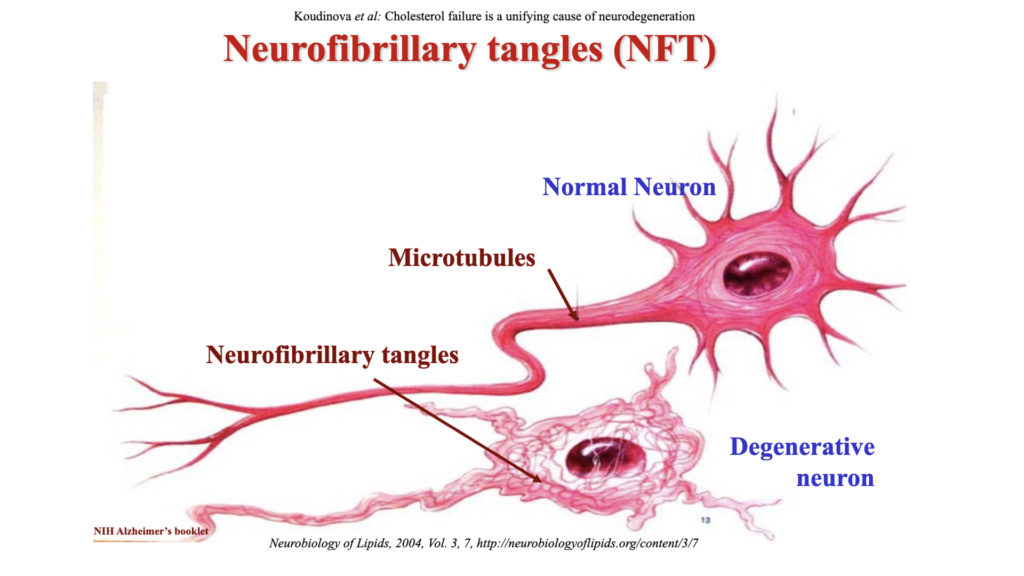
The cell on top is from a mouse not on statins. It’s normal looking. The cell on the bottom is from a mouse on statins, and it’s degenerating. Neurofibrillary tangles are one of the hallmarks of Alzheimer’s.
The image above is from an article called Simvastatin impairs hippocampal synaptic plasticity and cognitive function in mice.
We’ve known that “synaptic plasticity” makes learning possible. This study showed that brain cells need cholesterol for constructing the physical structures that bring about learning.
The study authors depleted cells of cholesterol and examined them under a microscope. They witnessed branches of brain cells that connect one cell to other visibly shrinking back. Compared to healthy cells, brain cells deprived of cholesterol looked shriveled and struggling. Like sad little sea creatures that have had some of their limbs cut off.
In other words, simvastatin shrinks your hippocampus, disrupting your ability to form new memories.
Cholesterol Supports Thinking, Problem Solving, Memory Formation, and Recall
Another group of researchers studied the brain as a whole. They found that what applies to the hippocampus also applies everywhere throughout the brain. Everything shrinks. They concluded, “Cholesterol depletion leads to synaptic and dendritic spine degeneration, failed neurotransmission, and decreased synaptic plasticity.” Translation: without enough cholesterol, brain cells can’t talk to each other normally, so you can’t recall old memories. And brain cells can’t grow normally, so you can’t learn.
You know that saying “you only use 10 percent of your brain?” That’s from 200 years ago. Now we know your brain uses every square inch of tissue. To lose a little brain tissue is to lose a little bit of yourself.
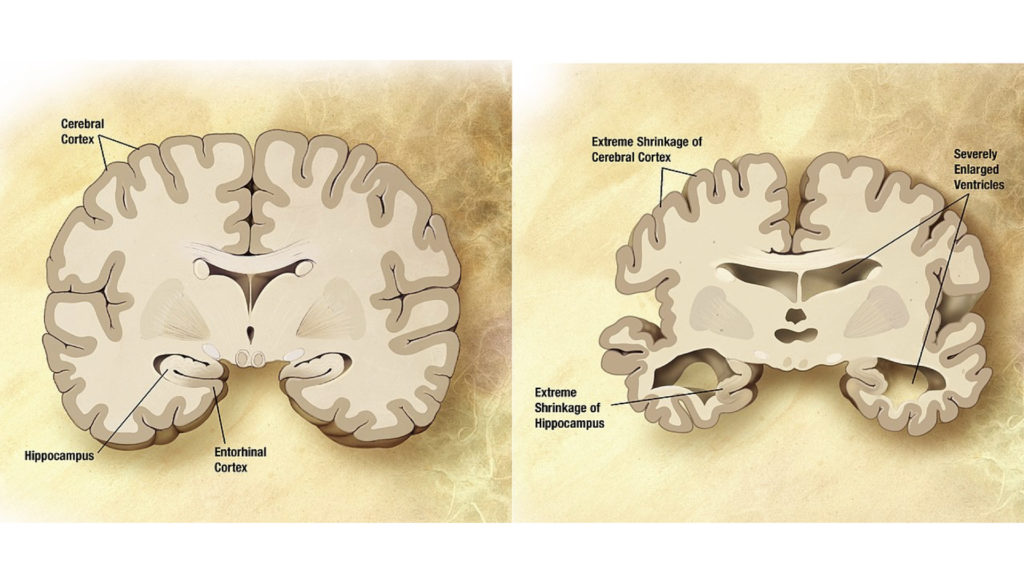
So does this mean statins can give you early Alzheimer’s? Well, it’s very suggestive. But let’s look at studies designed more specifically to help answer that question.
Reason Two To Avoid Statins: Scientists use high-dose statins to give lab animals learning and memory disorders.
The previous section talked about research on how statins changed the appearance of brain cells under microscopes. This section highlights a study showing how statin-induced brain cell changes impact a living, unlucky lab animal.
Here’s a nice picture from the study.
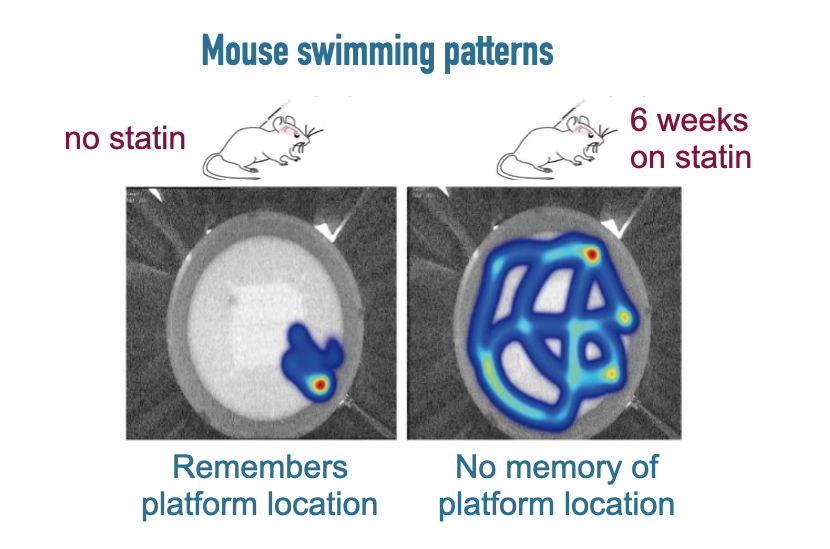
The study confirms that when you give cholesterol-lowering drugs to animals, it impairs hippocampal functioning. By how much and how fast? After just six weeks you’re in serious dementia territory.
It’s important to note that in order to get the profound effect in such a short time, the study used a much bigger dose than doctors use. Instead of the 0 .3-0 .8mg/kg we get, the mouse got 30 mg/kg. So fortunately the takeaway from this is not that 6 weeks of a normal dose gives you Alzheimer’s. It’s that cholesterol depletion puts you on a fast track to Alzheimer’s. The more profoundly you deplete your brain’s cholesterol, the faster you arrive.
The good news is that when the mice stopped the statins and their cholesterol levels rebounded, they regained some lost abilities. We don’t know if the same can happen in humans. Presumably, though, the sooner you stop the statin, the sooner you can start to recover.
Reason Three To Avoid Statins: Doctors who study how statins affect brain health have tried to warn other doctors about their findings.
You may wonder, if statins are really capable of causing learning problems, how is it that doctors don’t know this? Well, some do. And they’ve tried to warn others. Many such warnings have been published over the decades. I’ll review two of the more recent ones.
First:
Warning: Cholesterol below 160 may reduce speaking ability in Parkinson’s disease.
Pro-statin pundits try to claim that lowering cholesterol should theoretically be good for the brain. These theoretical benefits include protecting people against diseases like Parkinson’s. Therefore, take a statin.
To test that idea, a group of neurologists studied whether Parkinson’s disease progressed more quickly or more slowly in people with lower cholesterol. Everyone in the study was also on a statin.
They specifically looked at an aspect of Parkinson’s related to talking, called speech fluency. Lower speech fluency reflects a difficulty forming words and expressing thoughts. Greater speech fluency makes it easier to communicate and express ideas, needs, emotions, etc.
They found people with lower cholesterol levels fared poorly compared to people with higher cholesterol levels. People with lower cholesterol had slower, halting, and more distorted speech. Their brain MRIs showed them to have lost grey matter in multiple areas, including the part of the temporal lobe responsible for speaking fluently.
They concluded with a (rather understated) warning that reducing total cholesterol below 160 might be ill-advised for Parkinson’s disease, and possibly for others as well.
This potential practice-changing evidence has so far fallen on deaf ears. There is still no lower limit set for total cholesterol. In fact, right now, most doctors would agree with this advice from VeryWellHealth “From the standpoint of heart health, a total cholesterol level can never be too low.”
An absolutely ridiculous statement, but there it is.
Warning: Taking statins may speed cognitive decline in people over age 65.
Again, in response to pro-statin pundits promising benefits to mental function, a group of neurologists designed a study. They simply wanted to see if taking statins to lower cholesterol improved or worsened people’s mental function. So, they studied people over age 65 who were taking statins to prevent stroke. They tested cholesterol levels and put them through a battery of cognitive tests twice, first at the beginning of the study and again after a year.

The results were crystal clear: the lower a person’s cholesterol got, the worse their memory got. In fact, they found that there was a direct relationship between lower cholesterol and worse performance on the test. Age was the only factor that predicted worsening performance more accurately.
Which test picks up memory problems the best?
Importantly, one of the three tests failed to detect any memory decline, the Mini-Mental Status test. But that’s the test doctors usually do. The best test was the Montreal Cognitive Assessment, which very few doctors perform. This would suggest that doctors are doing the wrong tests to pick up early cognitive declines related to statin use.
Most people on statins assume that the lower their cholesterol gets, the better their overall health. This study shows the opposite is true, at least when it comes to brain health. Taking statins appears to dramatically disrupt brain function, at least over age 65. Not only is your doctor probably unaware of this research, but he is most likely doing the wrong tests to pick up any problems early.
The article warns, “Physicians should be cautious when prescribing statins to elderly people.”
It’s impossible to predict what exactly statins will do to your brain. But it’s unlikely they’re going to protect it.
If you’re starting to wonder why most doctors do not know any of this, it’s because of reason 4.
Reason Four to Avoid Statins: Statin’s supposed benefits to the brain are exaggerated or fabricated.
Fabricating benefits by writing misleading titles.
Journalists have a saying, “Don’t bury the lead.” It means if you want people to read your story, tell them the most exciting or important news right upfront. Well, it also works in the opposite. When you don’t want someone to read a story keep the most important part out of the title. And if you’re really intent on hiding the truth, get creative with the title, so readers don’t see a reason to read the rest of your article.
Take a look at this piece of creative science fiction. An article called “The beneficial effects of HMG-CoA reductase inhibitors in the processes of neurodegeneration.” Here’s what the title means in English: “The beneficial effects of statins on nerve degeneration.” Nerve degeneration is the process behind diseases like Alzheimer’s’, Parkinson’s, multiple sclerosis, and many more brain and nervous system disorders.
Most doctors reading the title would reasonably expect the article to discuss a bunch of evidence that taking a statin prevents or even possibly reverse these terrible diseases. A drug that prevents heart attacks, dementia, and movement disorders! Who in their right mind could say no? And, a busy doctor might think, Why bother reading the whole thing? I get the idea!
Always read the data.
You know how I keep saying you ALWAYS need to check ingredients to see if something has seed oils in it? Even if it’s organic, GMO-free, and sold in a trendy hip expensive store, you need to read the fine print.
Well, the same is true for medical journal titles. You can’t trust them. You ALWAYS need to read through the whole article and check all the data for yourself.
And indeed when you read this article in totality, you find no support for the neuroprotection claim. There is a lot of mumbo jumbo about the theoretical benefits. What you won’t see is a shred of data showing any such realized benefit. I find it disturbing that this particular article even got published.
And it gets worse. When you finally reach the part where they summarize data from human trials, what do you run into? “Statin use may be associated with a higher PD [Parkinson’s Disease] risk, whereas higher total cholesterol may be associated with lower risk. These data are inconsistent with the hypothesis that statins are protective against Parkinson’s Disease.”
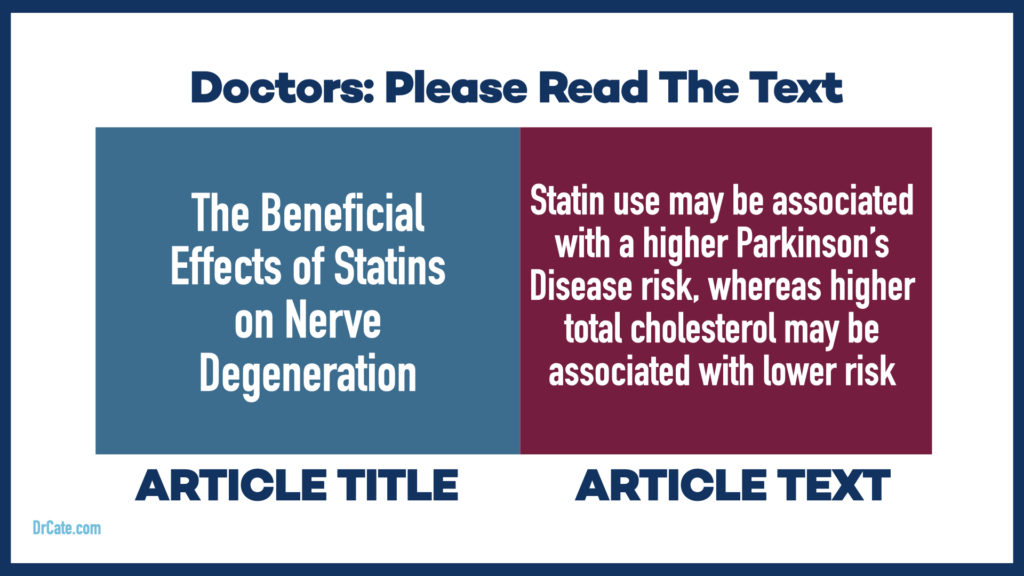
They literally just admitted that their study shows the exact opposite of what the title suggests.
So far, few doctors have picked up on these kinds of tricks and diversions. So journal editors, who depend on advertising money from drug companies, just keep repeating the process. It’s a real win-win for them, like having their cake and eating it, too. They get to hang on to the bright, shiny idea that they ethically uphold the truth, which is that the study in question shows that statins can be quite harmful. At the same time, by making it very hard to find the truth, they also get to keep the money flowing.
It’s especially scary to see doctors being fooled like this when the mechanism of action makes no sense. The mechanism of action is reducing cholesterol. That’s what it does. (Some pundits claim statins are anti-inflammatory, debunking that will need to wait for a future post.) So….less cholesterol in the brain makes your brain smaller and that’s …um, good?
Let me give you an analogy, for fun. Say you wanted to drive across the country. Someone tells you that if you want to make the journey more quickly you should limit how much gas you put into the tank at each rest station to just a single gallon instead of filling it to capacity. You don’t need to be an engineer to guess that such a strategy is unlikely to get you there faster than normal. However, there is every reason to believe that filling up the gas tank every 20-40 miles will slow you down compared to filling it up every 200-400 miles. Likewise, there is every reason to believe that blocking your brain’s ability to make cholesterol when it needs to do so will impair your brain health.
A small request for my fellow medical professionals.
I am writing this article mostly for patients. But if you happen to be a medical professional, please take this to heart: We go to school for a long time. If you graduated from medical school, then you have the knowledge to draw your own conclusions. You know how enzymes work, that brain cells need to make a whole bunch of cholesterol from scratch, and that statins block this important process. Do you really believe that blocking cholesterol-making enzymes in a person’s brain will help brain function? We don’t need to blindly trust the consensus panels—we might still be treating infections with mercury and telling new mothers to use formula if nobody questioned the status quo.
In the same way that I’m encouraging people to think for themselves, we as doctors need to muster the courage to think for ourselves as well. If not for your patients then do it for yourself because the less you think independently, the more replaceable you become.
Using relative risk instead of real risk.
Even though drug companies can completely rig their studies, they still need to exaggerate benefits to get doctors to write more prescriptions.
A 2017 study that has influenced the decision trees your doctor follows claims that taking a statin for high LDL can help people with zero risk factors for heart attack cut their risk of fatal heart attacks by 27%. That’s the figure your doctor saw, and probably believed was true. But in reality, the study showed that taking a statin actually cut the risk by less than 3%.
How do they get away with that?
By using a concept called “relative risk reduction.” Relative risk reduction tells you how much the risk is reduced in a treatment group compared with a control group. For example, if 20% of patients die using no drug, and only 15% die using drug X, the relative risk reduction from drug X is 25%. What you really want to know is something called absolute risk reduction. Absolute risk reduction gives you the actual improvement in risk from taking a drug.
The image below shows an example of the difference between relative and absolute risk reductions for an imaginary cancer drug. In the example, relative risk reduction is 50% and the calculation for absolute risk reduction gives you 0.1%. The 50% number obviously sounds a lot better, so this is what gets reported. And it sounds quite exciting! So this is what most doctors believe and remember. But the truth is very different.
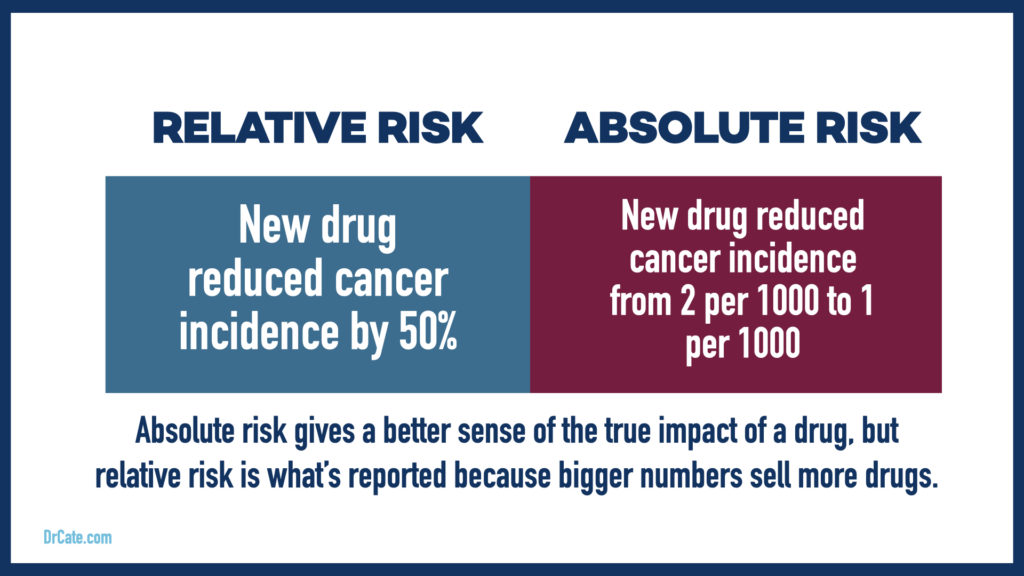
Let’s take a look at an example using money, which is more fun to think about than drug side effects. Let’s say your 401K is worth $100,000 and your money manager gave you a four percent return in 2020. That earned you $4,000. For the sake of easy math, let’s say in 2021 you start with the same 100,000 but this year your money manager gives you a five percent return, earning $5,000, which is 20% more than he earned the year before. That’s a relative improvement of 20% in his performance. But the absolute increase in dollar value of what he earned compared to the year 2020 was $1,000, or just 1%.
Now, if he tried to convince you that in 2021 he increased the value of your entire portfolio by 20%, you’d fire him. But that’s what the drug companies do.
Statin studies typically report relative risk instead of absolute risk, which falsely magnifies the benefit of the drugs. By using relative risk reduction they make everyone think their drugs do much more than they actually do.
To fully appreciate the power of this simple wordplay, watch his lecture, called “David Diamond on Deception in Cholesterol Research: Separating Truth From Profitable Fiction
Reason Five: Statin side effects are underreported.
Ever wonder why doctors ignore patients who complain about statin side effects?
Here’s the reason: Spin.
Every single time bad news for the statin industry like this makes it into the news, it gets handled. Someone from the AHA or Harvard, or Tufts, or another elite institution who gets money from drug companies (on the down-low) comes out of the woodwork to tell us not to believe it. And they have logical-sounding reasons. So if you’re too mentally tired (from your statin) to dig down into the source yourself and see it’s actually valid, you’ll believe the respectable-looking gentlemen from the Ivy League with the MD and multiple accolades to his name.
Except once, in 2016, with the video in the link above. The respectable-looking expert is Dr. Steven Nissen with the Cleveland Clinic. He has long been an apologist for the statin industry. When I heard him say “statin muscle side effects are a real problem,” I was shocked.
But then I read the full press release issued with the story. It turns out, that the industry apologist dabbled in truth-telling this one time for a reason: to hype up the next cholesterol-lowering drug in the pipeline, called a PCSK9 inhibitor.
The PCSK9 Debacle
PCSK9 inhibitors lower cholesterol by a different mechanism than statins. So, everyone assumed they would have different side effects. Back in 2016, the year of the video, PCSK9 inhibitors were thought to be the next huge blockbuster drug. With that in mind, it seems that the video and associated press release represent a gamble. Although this news might negatively impact statins, they gambled that more people would focus on investing in the next big cholesterol-lowering drug.
Death by low cholesterol.
But by 2018, the PCSK9 gambit turned out to be a total bust. In clinical trials, PCSK9 inhibitors increase mortality, meaning they have a side effect of killing people so studies were stopped early and that was the end of their blockbuster story. (This was not the first cholesterol-lowering drug to do more harm than good. A 1950s drug Triparanol blinded animals but that was not reported until it came out during the lawsuits filed after people developed cataracts.)
Huge drug fail embarrassment aside, Dr. Nissen’s admission, that statins cause muscle problems, was now sticking out like a sore thumb.
To deal with the sore thumb sticking out, in 2018, the AHA came out with a new study encouraging doctors to dismiss studies indicating patients’ complaints might actually be real. Trust the Blinded Randomized Evidence That Statin Therapy Rarely Causes Symptomatic Side Effects. The idea is that “blinded randomized evidence” is more reliable than any other kind of evidence.
But you can stack the deck to make the drug look safer than it is, even in these so-called gold-standard double-blinded, randomized studies. Here’s how.
If you can run-in you can hide.
According to “real world” studies, 20 percent of people on statins report muscle aches. In double-blinded trials, that number is less than 1 percent with most claiming muscle aches affect an even smaller number, less than 0.1%.
If you’re running a study and want to get rid of people complaining of side effects you can! Just kick the people complaining of side effects out of the study.
Wait. Seriously. How would they get away with that?
It’s simple. You kick people out before the study officially starts.
These large, double-blinded studies are very selective about who gets into the study. That’s why they’re not “real world.” They can exclude people who have medical problems that might make the drug look unfavorable. For example, statin studies usually exclude people with a history of heart failure and cancer.
They can also exclude people who feel bad when they take a statin.
They do this using something called a run-in period. The run-in allows the drug company to give the statin to everyone who signed up to be in the study and identify who has problems. People who report side effects are kicked out of the study. Their medical complaints can legally stay out of the final written documents submitted for publication.
Those who remain may metabolize the drug better, or they may simply be non-complainers. But either way, kicking out the complainers makes the drug look far safer than it is. In some cases, 99.9 percent safer.
Putting a positive spin on the accusation that run-in periods game the system.
The run-in related evidence-hiding accusations have been around for decades. In 2018, a group of scientists (who failed to disclosed funding sources) published a study to determine if using a run-in period changed safety data. The study was called “Reasons for disparity in statin adherence rates between clinical trials and real-world observations: a review.” They concluded that using a run-in period does not make statins look safer and that the “reasons for disparity” are that the studies reporting higher side effect rates are not double-blinded.
But, gosh darn it, when you read the article (always read ingredients) you see that 12 of the 15 articles they looked at to make their determination did not include a run-in period that included a statin. These studies used placebo in the run-in period. So they cheated, again.
The drug companies are unapologetic, recalcitrant cheaters. Asking them to assess whether or not their methods amount to cheating is plain old dumb. It’s like watching a thief steal your jewelry and then asking the thief as he’s holding his sack of all your stuff, hey, did you just take all my valuables? And then you let him go because he looked you in the eye and said no with a straight face.
“The Janus Face of Statins”
The most realistic official medical position on statin brain effects is to admit they might harm other organs but assert that they at least definitely protect the heart and probably have “pleiotropic” beneficial effects on the organs they also harm. Usually, these mystery pleiotropic effects refer to supposed inflammation-fighting properties. (They don’t fight inflammation except by suppressing the immune system, thus making you more likely to die of infections—future post material).
A classic example of the Janus Face concept is an article with the marathon title, “Cholesterol-independent neuroprotective and neurotoxic activities of statins: perspectives for statin use in Alzheimer disease and other age-related neurodegenerative disorders.” They’re saying sure statins have all these proven harms, but they have these benefits too.

Given what I’ve shown you about the kind of dishonest reporting and cheating they get away with, and given the basic common sense biology, it’s unlikely statins have any benefits to the brain and nervous system.
And consider this. The literature is full of case reports substantiating this gentleman’s claim that statins can disable you for life. But if statins actually do have neuroprotective effects, as the industry claims they do, then why are there no case reports from people who recover from degenerative neurologic diseases after starting a statin?
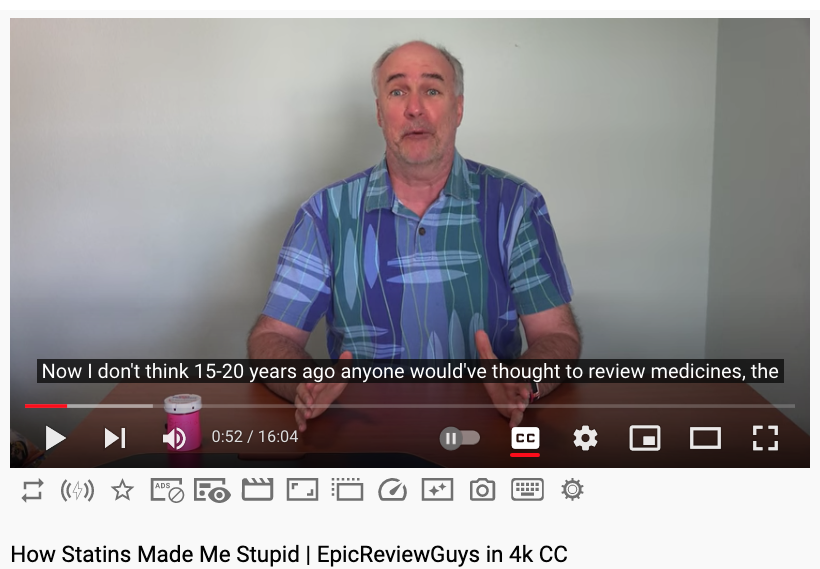
Dr. Cate’s takeaway:
Your brain needs to be able to make cholesterol in order to function, and statin drugs disrupt your brain’s capacity for making cholesterol. There is solid research showing statins can disrupt nerve cell metabolism and multiple aspects of brain function. In my own clinical experience, significant mental function loss seems to be the rule, not the exception, after using statins for more than ten years. My own first-hand observations, the peer-reviewed research, and the common-sense principle tell me that statins may cause serious brain disorders including movement disorders and dementia.
So what should you do to lower cholesterol? If you’re worried about high cholesterol, you really should read the origin story of the imperative to lower cholesterol.
Learn more about statin harms.
This is such a big, messy issue, I’ve been writing about it for years.
Click HERE for other articles.
Other MDs On Board
Ken Berry 10 worrisome things statin drugs do to your body
Heart Surgeon Dr. Phil Ovadia
“Realize that statins have now been the most prescribed medication for 20 years…and we are not seeing any meaningful reduction in the incidence of heart disease… So there’s got to be something wrong again with the approach that we’re taking.” Full interview HERE.
Psychiatrist Emily Deans
Low Cholesterol and Suicide (Again) Another study links low cholesterol to depression and suicide attempts.
Obesity Medicine Association, past president Dr. Eric Westman
“LDL isn’t the best marker when it comes to blood cholesterol” Watch his presentation here:
Related articles on DrCate.com
For the story on why anyone ever thought lowering cholesterol might be a good idea. This three-part article series dives into the most likely true cause of heart attacks, according to the actual science.
Cholesterol: What the American Heart Association is Hiding from You (Part 1)
**MEDICAL LEGAL DISCLAIMER**: Dr Cate does not provide medical advice, and the information available on this channel does not offer a diagnosis or advice regarding treatment. Information presented in these lessons is for EDUCATIONAL PURPOSES ONLY, and information presented here is NOT TO BE USED as an alternative to a healthcare professional’s diagnosis and treatment of any person/animal.
Only a physician or other licensed healthcare professional are able to determine the requirement for medical assistance to be given to a patient. Please seek the advice of your physician or other licensed healthcare provider if you have any questions regarding a medical condition.
EXCLAIMER: The content used in this lesson is used in accordance with Fair Use laws and is intended for educational purposes only.
Please note: Please do not share personal medical information in a comment on our posts. It will be deleted due to HIPAA regulations.
This Post Has 32 Comments
Note: Please do not share personal information with a medical question in our comment section. Comments containing this content will be deleted due to HIPAA regulations.
















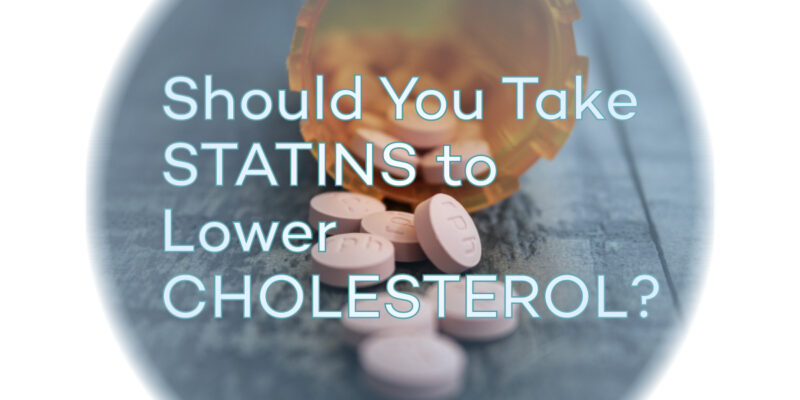


I was lucky enough to subscribe to a weekly newsletter, early 2000s, Yahoo Group’s heyday, put out by a group of investigators, whistleblowers, researchers not liking their research being buried and so on. CI found out all this about statins before anyone else, as well as many other drugs, salt, diet and nutrition in this country….
Sadly the owner was moving to Slovenia and sold it to someone he trusted. Maybe four months before that woman started adding things about vaccines including tissue from aborted babies. That was that.
I read and understand medical research studies, abstracts as well as the results. I can’t speak it or write it myself but I can translate to tell others . I find that studies need to toe the party line, so we gave to really search for legitimate studies with legitimate results.
“Heart Healthy” is suspicious. And “FDA approved”. Registered nutritionist and or dietician.
At this point I distrust most medical associations, and always check first for the money trail .
I’m not a doctor, I am smart with a good memory and I like to read. A lot. Born in a family of iconoclasts.
My wife had a TIA stroke. Doctor wants to put her on statins. Says he has 30% blockage of the artery that goes up her neck.
HDL 38
LDL 181
TOTAL 250
TRIGLYCERIDES 162
Will statins help?
That’s a good question for the doctor who wants to prescribe them. Ask that doctor to show you a randomized double blinded clinical trial comparing any statin against placebo for its ability to reduce plaque. (Don’t fall for it if the study only shows that it reduces “intimal thickness” because that may mean statins weaken the artery wall.)
Dr. Cate – My mom was recently prescribed a statin and has a family history of Alzheimer’s. I tried to persuade her to not fill the prescription. I’d love to share this information with her. Do you have a printable version of this article?
Thank you!
I wish but I’m not that sophisticated!
Hi Dr. Cate,
My husband and I very much appreciate your information. My husband has 70-80% blockage in his left carotid artery, which was diagnosed a couple of years ago. He was invited to be part of a NIH study and was randomly assigned to the medication group (as opposed to the surgery group) and was put on Clopidogrel 75 MG and Rosuvastatin 5MG. His total cholesterol before taking statins was 196 and since being on statins has dropped to 135. As a result of reading your articles, he stopped taking the statins. Have you had patients improve/heal carotid artery blockage on your diet? Would you recommend stopping the statins in this circumstance?
We would be interested in your class. Thank you.
Hi Kathy, I do not have the classes ready yet so I would recommend signing up for a 1:1 discussion with me. Click the appointments tab at the top of the page for more information.
I would be interested in more info about statin drugs. At age 69, 3/12/22, I had a major heart attack. I was, of course, put on a whole battery of heart medications, including atorvastatin. Having previously read about many of the drugs I am now taking, I’m not particularly happy about taking them, but don’t have enough “ammunition” to take to my heart doctor to be taken off them, or switched, or …. I’ve read Deep Nutrition, FatBurn Fix, and will likely start Food Rules next week. My husband and I are “all in” with making these important changes in our diets!
Hi Dr. Cate, My husband and I have been reviewing the information in your book and recently visited your website. We are both intrigued! My husband has high cholesterol and has been prescribed several different statins. He has noticed side effects on every statin almost immediately and I can definitely see a difference in his energy level and mood while taking statins. He has never taken statins for more than a week. He decided to buy a supplement instead, CholestMD by IMD nutrition. The main ingredients are Niacin 400mg, Bergavit 550 mb, Olive Leaf 50 mg, and Garlic Bulb 130 mg. Is this supplement possibly harming him like a statin would or likely not even making a difference?
Those supplements are not harmful, no. However once you get to the rule about smart supplementation in the five rules that fix your FATBURN chapter of the FATBURN FIX, you may decide to stop those, too. 🙂
Hello Dr. Cate,
My wife and I are thrilled to have found you on the Megyn Kelly podcast. We’ve purged the pantry and the oils under the range. How long does it take to get the toxins out of the body after making this change?
Also, we made our first batch of beef bone broth over the weekend using free range beef knuckles. Looking forward to using it!
Thanks so much.
Coach Craig
This is interesting and certainly worth exploring. However, I sense the same type of alarmist messaging that I remember hearing years ago about saccharin causing cancer in rats.
What you didn’t stress from that study paper you linked to was that the animals were given a dose of 30 mg/kg/d for 26 days! If I were to take that much of my statin, it would be nearly 300 pills a day.
If I were to drink 300 times more water per day than I typically do, I would have major problems. If I were to walk 300 times the distance per day than I typically do, I would have major problems. Extreme doses of just about anything will cause major problems. If you had presented a study showing that a typical dosage of statins, or even a dosage within an order of magnitude of a typical dosage, caused problems for the animals, it would be a lot more meaningful.
You make a good point and I should highlight the reasons why they used such a high dose. Thank you. I edited.
But your math is off and exaggerates your point. Calculating the magnitude of difference between a normal 40mg human dose for an overweight American adult and the study dose it’s not even close to 300x. For a thin (120-pound) person, it would be much less, closer to 40x.
Doing the math for the average weight 160-pound human American female, 40mg of simvastatin equates to about 0.57 mg/kg, which is about 1/52th of the study dose.
Note that simvastatin is used in children at a dose of 10-40mg. So a 40-pound child might get more than 2mg/kg, which is just 1/15th of the study dose!
I don’t intend to be an “alarmist.” I intend to be accurate. But, if you consider the horrific consequences this prescribing practice must be having on children, then I think sounding alarms is warranted here.
My doctor, part of a corporate practice, tells me at each of my insurance-mandated physicals that I need to get my cholesterol (260: LDL 183, HDL 60) is too high and she would like it under 160. I currently take no prescriptions and feel the best I’ve ever been at the age of 74. Per the sage advice of you and others, I would not dream of taking statins. Though I don’t need this particular class, I would love to see other nutritional classes if you can manage. I’m also interested in your take on “Drop Acid” by Dr. Permutter and “Unlocking the Keto Code” by Dr. Gundry. In particular, Dr. Gundry extols the benefits of Canola oil, which I continue to avoid at all cost.
I think you just answered your question about what I think of Dr. Gundry’s advice on Canola.
If you have a question about a specific piece of Dr. Perlmutter or Dr. Gundry’s advice and a specific outcome they promise from following that advice, I’d be happy to address it.
However, it might make more sense for you to ask Dr. Perlmutter and Dr. Gundry questions about their recommendations don’t you think?
But I think you might really be asking about trust. Because when nutrition experts make radically different recommendations it’s understandably anxiety-provoking and “how do I know who to trust?” becomes a real concern. That’s such an important question that I will be answering it in some detail in a near-future post.
Dr. Shanahan, First I have read your books, Deep Nutrition and Fatburn and found both to be excellent. This was a very good, no a great post on your part. Its surprising how many people including some who posted here believe high cholesterol to be an issue. Of course big pharma has done an outstanding job at convincing and publicizing the “cholesterol issue”. Doctor recommended statins for me several years ago and I did my due diligence and could not find convincing evidence for them. It seems to have some parallels to Type 2 diabetes in that we have a drug for it so problem solved.
I have come to believe that with cholesterol the composition of it, (LDL-P, % small pelletized particles, HDL and triglyceride ratios) is much more relevant than raw numbers.
I was a computer scientist and worked with quantum physics while working but since retiring have come to believe organic chemistry is far more complex than either.
Please keep the great writing up.
I am 72 and have a Ph.D. in human nutrition. I try to practise good nutrition based on my years of learning. My total cholesterol is on the high side but so is my HDL cholesterol, so my ratio of the two is only about 3.0, which puts me at low risk for heart disease. My cardiac arteries’ calcium score is zero and has been zero for the past six years, since I first began getting tested, and when I plug those numbers into an algorithm, my risk for heart disease is only 1.9% over the next 10 years. However, my doctor wants me to start taking a statin. I have always refused, and your article on brain health has reinforced my decision, so thank you for that!
Here is another reason I don’t want to take a statin. I have osteoarthritis and take quite a high dose of an omega-3 supplement with significant levels of both EPA and DHA (my Ph.D. thesis was about omega-3 supplementation and rheumatoid arthritis). As many people know, the membrane that surrounds every cell in the body is made up of a semi-solid cholesterol layer and a semi-liquid phospholipid layer. Much of the fish oil I take ends up in this phospholipid layer, making it more “liquid-y”, so my hypothesis is that I need a good amount of cholesterol in the more solid layer of the cell membranes to maintain their solid structure and prevent the membranes from becoming leaky, and permitting, for example, carcinogens to sneak into the cells. In other words, I don’t want to reduce my cholesterol level because I want to maintain a good balance between cholesterol and phospholipids in all of my cell membranes. Does this sound reasonable?
You are 100% correct that cholesterol helps maintain cell membrane integrity.
am interested in your class. My cardio has recommended repatha after I developed cognitive issues on statin . Trying to figure out what to do. As tc 300+ and ldl>200. FH cardiac on father’s side with early mortality. At 65 I feel great, calcium score 0, carotids with mild (10%) occlusion. Apoe 3/4. Been following autoimmune diet for 10 years. Very reluctant and overwhelmed by how complicated the issue is. Will appreciate educational information, please send me information.
I note a near absence of any discussion of alternatives to statins for high cholesterol and, especially, high LDL combined with low HDL.
Increasing HDL-cholesterol levels is difficult dietarily. An important method of increasing HDL-cholesterol is through exercise.
Your point about exercise is a good one! However, increasing HDL through diet is very easy in my experience it never fails to improve when you follow the kind of diet I recommend (See post on Deep Nutrition). It may take a while, but it so far has always improved.
Can my mom’s thyroid disease be cured? Even missing out medication for a day causes terribly.. Help
There are many types, some resolve on their own, some don’t. Sorry can’t give more detail without a proper medical history.
I found your website after listening to you on the Megyn Kelly Show. I really enjoyed the episode and learned a ton. My mother was on statin drugs for years and was recently diagnosed with type 1 diabetes at the age of 75. Her doctor said the statin could be the culprit, attacking the pancreas. Is this something you have heard of? She has been able to control her blood sugar with diet for a couple years but is now facing going on insulin. It really has been a struggle for her.
Statins can promote type 2 diabetes and have many unhappy metabolic consequences. They can cause liver failure but I’ve not heard that they can cause pancreatic beta-cell failure (that’s the root of type 1 diabetes).
However, if she had type 2 and it was not diagnosed that can progress to type 1. Statins may accelerate that process.
She has always been diligent in getting blood work every six month as she takes thyroid medication. Her blood sugar has always been good. No family history either. The Dr was very surprised it was type one at the age of 77.
Dr. Cate,
I just caught your appearance on the Megyn Kelly show. I was especially drawn to you and Megyn discussing Ezekiel bread and her weakness for crackers. 🙂 I was wondering if you had an opinion on Simple Mills products, specifically their crackers and bread mix. I’ve tried them and found them tasty. Are they as bad as their regular counterparts, or does the fact that they’re made from almond flour make them better choices?
Almond flour can be more nutritious than wheat flour, especially if it’s made from good-quality almonds. But if not or it’s old it can be less healthy because it does not store well. Just make sure to use it quickly and before baking use your nose to make sure it still smells fresh. And it should taste great!
Hi Dr. Cate, I would be interested in participating in a class. While I’m not taking statins based on your advice, I do have cholesterol issues and was prescribed herbal statins by my ND….would be great to learn as much as possible on the subject…. Thanks, Sue
This is very concerning information for all of us and for me personally. I resisted statin use for 20 years as my cholesterol levels continued to climb and my doctors continually suggested statins. I ate a good fat, very, very low seed oil diet and had read Dr. Cate’s book years ago and Ufi Ravensberg’s (spelling?) as well as Dr. Malcolm Kendrick’s and I took their wisdom to heart. I have never smoked and am no athlete but reasonably active. At 68 years old my total reached 360 mg/dl, my LDL 256. A calcium scan revealed some deposits although I don’t remember the score. My doctor reminded me that both my mother and father had early strokes (my father in his 40ties) and heart attacks. I read what appeared to be convincing information from what appeared to be reliable sources about statins as preservatives of cognitive function and I was finally convinced. I have taken rosuvastatin for about a year and my levels have fallen to 225 total (go lower said my doctor- an osteopath actually open to alternative ideas) and 140 LDL. I don’t seem to have any side effects but do feel my memory is not what it used to be but that was happening before taking the drug. Now I don’t know what to do. I am raising a grandchild so I need to be healthy and sharp for as long as possible.
It is confusing and unsettling to imagine the deception and ignorance described in this article. I far fear cognitive decline over a heart attack. I’d much rather die of a heart attack than linger in the realm of dementia, but neither please, of course. If I stop taking them suddenly will there be an immediate rise in levels? Were my levels so high that stain use was actually justified? Thank you for your efforts to bring the truth to us struggling and confused patients.
I am so sorry that knowledge in this case feels disempowering!
But to answer your question about sudden-ness: when I work with people who I have discussed all the risks and benefits of cutting statins and they’ve decided to go forward, I cut it down slowly.
Your question: Was statin use justified? I translate that to: Would statins possibly have a benefit? And the sad reality is the data gives us no answer but we also have no reason to think they would help. We are left to use other tools to answer that question. Fortunately, there are plenty of other tools, an absolute cornucopia, and that’s why I want to have a class.
Please stay tuned for release date and join if you can!